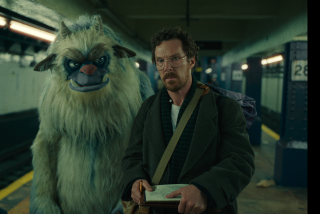Family Business <i> by Vincent Patrick (Poseidon: $16.95; 281 pp.)</i>
Stir a pinch of Dostoevski into a whiskey fizz, drop in a healthy splash of Damon Runyon, and you get some idea of a Vincent Patrick story. In this, his second novel, the acclaimed author of “The Pope of Greenwich Village” has once more melded such lofty preoccupations as sin, fate and retribution with an engaging tale of colorful New York ethnics tripping into crime. Though not as arresting nor pungently written as the earlier book, “Family Business” may be the better of the two, certainly the more ambitious and touching.
Again Patrick’s protagonists are relatives and are of complex lineage, but this time the bloodlines are truly exotic. At center stage is Vito McMullen, who, as his moniker announces, shares the Italo-Irish heritage of “Pope’s” Charlie Moran. Vito’s father Jessie, a bar-brawling sexagenarian, is American Indian on his mother’s side. And Vito’s son Adam has--what else?--a fully Jewish mother named Elaine, at whose elderly parents’ apartment in the Bronx the story eccentrically begins, with a Passover Seder.
Such a genetic melange might seem laughably contrived were it not for its considerable thematic significance in the novel. For this is a book not merely about family ties but about the destiny of germplasm. Jessie, in his proud grandson’s words, is a “ ‘bona fide, lifelong, fully committed . . . proud-to-be-a-thief thief’ ”; young Adam is a brilliant MIT dropout who’s been dealing dope in Berkeley. Now he returns East to enlist his father and grandfather in a sure-thing heist back in California (much as Paulie embroils his cousin Charlie in a burglary in the author’s earlier novel.) But Vito, a nearly honest wholesale meat distributor whose youthful foray into his father’s profession landed him in the slammer, is at first staunchly against the plan:
“ ‘I spent my childhood doing deals with my father,’ he said. ‘Now I’m going to spend my adulthood doing deals with my son? Somebody in this family ought to break the pattern. Kill off the McMullen criminal gene.’ ”
Wise up, sneers Jessie. “ ‘You can save a guy’s life twice and he can save yours. He can sacrifice his left hand for you . . . But you still can’t trust him a hundred percent unless you got the same blood. . . . I’m part Indian, so I know about blood. That’s what made tribes stick together. It’s nice . . . Blood loyalty makes life simple, Vito. Right, wrong, if, maybe, yes, no--none of it matters. You got something you can depend on.’ ”
Do it, says Adam to Vito. You need the money; your butcher business is unbecoming, and on the skids to boot. Vito in the middle feels the odd man out. His father and son, he notices, both have heavier beards than he--”another group of genes that seemed to have skipped a generation and emerged intact in Adam.”
Even the crime in question is symbolic: the theft from a biotechnology firm in Silicon Valley of some ultra-secret designer genes that control the nitrogen-fixing capabilities of plants and would enable fertilizer-free agriculture. A Boston chum of Adam’s is offering a cool million for the stuff. A team of burglars is called for, one of whom must know his molecular biology and recognize which test tubes to cop from the lab. It’s a caper tailor-made for the McMullens.
Inevitably Vito goes along. He feels duty-bound to play chaperone and protect his son from the wily Jessie; more to the point, a third of a million is an irresistible lure, and Vito, despite his bourgeois patina, shares his father’s credo that complete honesty is for fools and that “there were a lot worse things in the world than being a thief.” In a somewhat improbable dinner-party scene, the McMullens, suddenly resembling Benthamite philosophers, debate the notions of morality versus legality and loyalty versus honesty, reaching the consensus--to Elaine’s chagrin--that Jessie’s code makes elemental sense.
Author Patrick’s repeated digressions into sociology and moral philosophy, though couched in vernacular terms, tend to dilute the novel’s earthy appeal. But the characters are so charming and the plot so cleverly engineered that it hardly matters. As is conventional in the lovable-rogue genre, the reader becomes a co-conspirator in the McMullens’ criminal intentions--which in this case includes complicity, however temporary, in their system of values too.
The California burglary does not come out as planned, which intensifies the battle between Vito and Jessie for Adam’s soul and converts the story into a powerful morality play. Its moving resolution occurs at yet another Passover Seder, the ultimate Judeo-Christian ritual and the fitting locus for the triumph of traditional virtue. By this point, “Family Business” has evolved far beyond a zippy crime yarn, but not, as it might have, into a facile sermonette; rather it is a creditable, if colloquial, meditation on nature and nurture, the premises of social conduct, and the very core of maleness--the agonized contest of fathers and sons.
More to Read
Sign up for our Book Club newsletter
Get the latest news, events and more from the Los Angeles Times Book Club, and help us get L.A. reading and talking.
You may occasionally receive promotional content from the Los Angeles Times.







